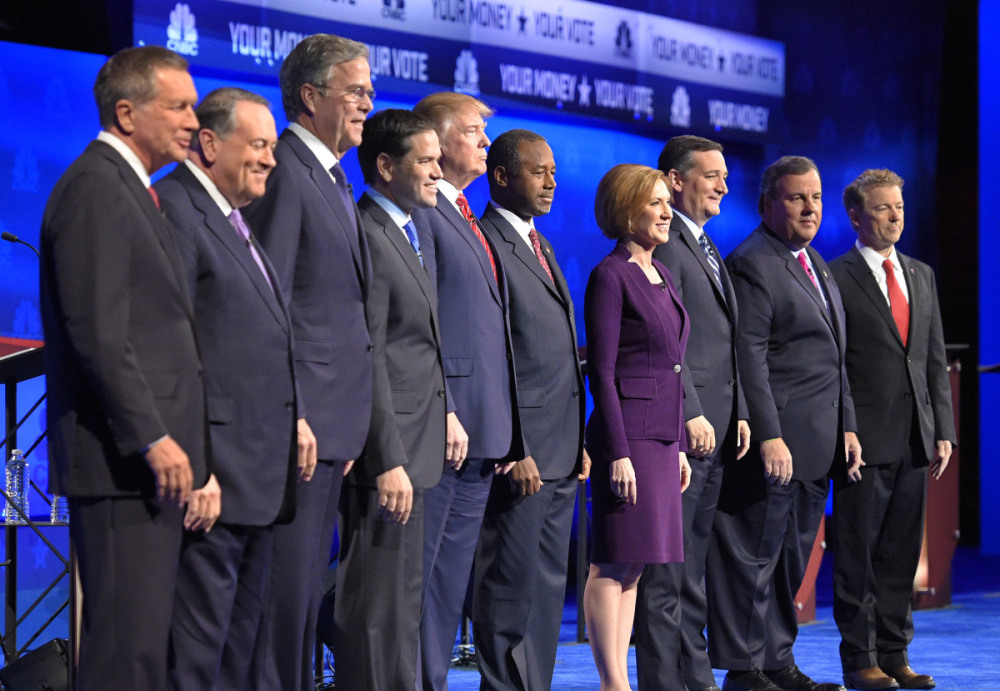
Donald Trump’s campaign plans to negotiate its own debate terms with television networks, effectively bypassing other Republican candidates who had hoped to band together to push for new rules.
“As we have for the previous three debates, the Trump Campaign will continue to negotiate directly with the host network to establish debate criteria that will determine Mr. Trump’s participation,” said a statement from campaign spokesperson Hope Hicks.
She added that “this is no different than the process that occurred prior to the FOX, CNN, and CNBC debates,” referring to the first three events featuring GOP candidates.
The announcement of Trump’s plan came a day after representatives from GOP campaigns met to prepare a list of group demands for upcoming debates in the wake of criticism of last week’s event in Colorado.
Among those new demands: Opening and closing statements of at least 30 second each, an equal number of questions for all candidates, and campaign approvals of any on-screen graphics during television broadcasts.
A letter listing the demands will also ask future media sponsors for specific information about their debate rules, officials said.
Republican Party chairman Reince Priebus, one of many GOP officials who criticized CNBC after a debate last week, said Monday it is fine for the campaigns to seek more influence over the conduct of these events.
“I do agree with them they should be more involved in the formatting,” Priebus said on ABC’s Good Morning America.
At this point, the campaigns have not agreed on other proposals, including one to eliminate preliminary debates with low-rated candidates and allow the entire field to appear on stage together.
In some ways, various campaigns are seeking to wrest power over the debates from the Republican National Committee.
RNC strategist Sean Spicer, speaking on CNN, said the candidates are entitled to tell the party what they want in the debates, “and for us to be able to advocate on their behalf.”
As part of that effort, the Republican National Committee made staff changes designed to ride herd on the debates.
Sean Cairncross, the chief operating officer of the RNC and its former chief counsel, is the party’s new debate negotiator and organizer, according to an email sent to campaigns from RNC Chief of Staff Katie Walsh.
Spicer, whose portfolio had included debates, will maintain his duties as chief strategist, with a supplementary role in the debates.
The candidates themselves also criticized the handling of last week’s debate, but warned the party should not go overboard in seeking changes.
New Jersey Gov. Chris Christie, appearing Monday on MSNBC, said last week’s session got “totally out of hand, ” because “everybody was jumping in, interrupting each other.” He and other candidates also criticized what they called the liberal bias of some of the questions.
Christie also said that engaging in any kind of debate is certainly no tougher than the job of being president.
“Put podiums up there, put whatever three people you want, ask me the questions,” Christie said. “If I can’t handle that, I got no business running against Hillary Clinton and I got no business running to be the president of the United States.”
The next Republican debate is scheduled for Nov. 10 in Milwaukee, sponsored by Fox Business Network and The Wall Street Journal. Another encounter is scheduled for Dec. 15 in Las Vegas, to be sponsored by CNN.
The GOP has also scheduled debates next year in the days before the Iowa caucuses, and the South Carolina and New Hampshire primaries.
Over the years, candidates from both parties have made various complaints about debates. This is the first presidential election year in which the parties have tried to seize control of the debate system.
In recent elections, candidates expressed frustration with the proliferation of debates sponsored by different media organizations.
For this election, the Republicans developed and the Democrats followed suit on a new system in which the parties sanctioned a specific and limited number of debates.
Candidates are told that, if they participate in a non-sanctioned event, they won’t be invited to a sanctioned debate. Any media organization that tries to hold a non-sanctioned debate won’t be considered for a sanctioned event.
Mo Elleithee, former communications director for the Democratic National Committee, said this is the first year the parties have developed a system “that has a shot at working to gain control of the debate system.”
Making it work is up to the candidates.
“The system only works if the candidates buy into it,” said Elleithee, currently the founding executive director of Georgetown University’s Institute of Politics and Public Service. “They are the key.”


